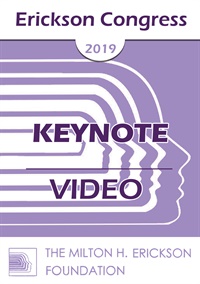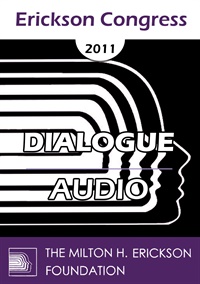
- Average Rating:
- Not yet rated
- Topic Areas:
- Dialogues | Relationships | Generative Psychotherapy
- Categories:
- Erickson Congress | Erickson Congress 2011
- Faculty:
- Robert Dilts, BA | Carol Kershaw, EdD | Dan Short, PhD
- Duration:
- 57:49
- Format:
- Audio Only
- Original Program Date:
- Dec 10, 2011
- Short Description:
- IC11 Dialogue 13 – Generative Relationships – Robert Dilts, Carol Kershaw, EdD, and Dan Short, PhD Generative Relationships Dialogue with Robert Dilts, Carol Kershaw and Dan Short.
- Price:
- $15.00 - Base Price

- Average Rating:
- Not yet rated
- Topic Areas:
- Trance | Short Courses | Reframing | Neuroscience | Relationships
- Categories:
- Erickson Congress | Erickson Congress 2011
- Faculty:
- Betty Blue, PhD
- Duration:
- 1:04:41
- Format:
- Audio Only
- Original Program Date:
- Dec 09, 2011
- Short Description:
- This workshop will use PowerPoint images, research, theories, examples and experiential exercises to demonstrate how therapeutically playful interaction with others may create lasting solutions by producing spiritually-uplifting catharsis and creatively explorative trance states capable of replacing sensations of helplessness with sensations of empowerment, enhancing sensations of meaningful relatedness, encouraging immune system functioning and possibly serving to “wake up” otherwise dormant genetic functioning and activate brain plasticity.
- Price:
- $15.00 - Base Price
Tags: Neuroscience Relationships Trance
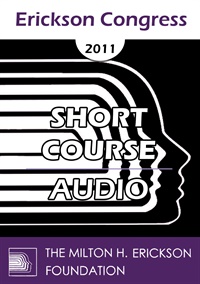
- Average Rating:
- Not yet rated
- Topic Areas:
- Short Courses | Attunement | Communication | Neuroscience | Relationships
- Categories:
- Erickson Congress | Erickson Congress 2011
- Faculty:
- Antonella Monini, MD
- Duration:
- 1:22:01
- Format:
- Audio Only
- Original Program Date:
- Dec 09, 2011
- Short Description:
- Communicating and understanding others, beyond the verbal language, are interactional motor experiences: the Mirror Neurons are the biological base of intentional attunement and underpin the ability to perceive the difference between action and mere movement. In this experiential workshop, therapists will learn ways to successfully interweave somatic awareness techniques to facilitate their ability to listen and respond to their embodied emotions. A variety of exercises from acting techniques will be taught that promote body language for communication avoiding cognitive processes to utilize the creative resources and to improve flexibility through self-exploration and self-expression.
- Price:
- $15.00 - Base Price
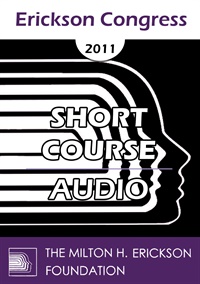
- Average Rating:
- Not yet rated
- Topic Areas:
- Short Courses | Brief Therapy | Couples Therapy | Psychotherapy | Intimacy | Relationships | Solution Oriented Approach
- Categories:
- Erickson Congress | Erickson Congress 2011
- Faculty:
- Robert Johansen, PhD | Ian Johansen, PhD | Todd Gaffney, PhD
- Duration:
- 41:06
- Format:
- Audio Only
- Original Program Date:
- Dec 09, 2011
- Short Description:
- The presentational will introduce a new and brief cognitive model for treating couples. It is a solution-focused model that proposes specific steps on how to differentiate types of love and how these impact an intimate relationship. The participants will develop strategies on how to effectively manage needs in an intimate relationship.
- Price:
- $15.00 - Base Price
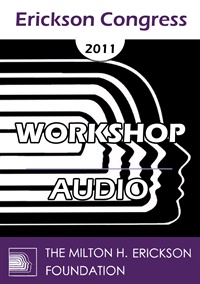
- Average Rating:
- Not yet rated
- Topic Areas:
- Couples Therapy | Hypnosis | Workshops | Affect | Conflict | Intimacy | Relationships
- Categories:
- Erickson Congress | Erickson Congress 2011
- Faculty:
- Carolyn Daitch, PhD
- Duration:
- 1 hour
- Format:
- Audio Only
- Original Program Date:
- Dec 07, 2011
- Short Description:
- This course will present concrete tools and methods of hypnosis to help couples end their habitual conflict escalation. Participants will learn the impact of affect dysregulation on relationships, client-friendly tools to enhance intimacy and connection, and how to rehearse and transfer skills from therapy to real life
- Price:
- $20.00 - Base Price
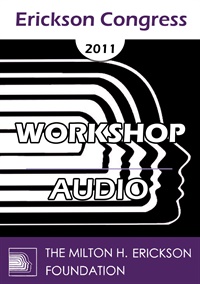
- Average Rating:
- Not yet rated
- Topic Areas:
- Hypnosis | Workshops | Resources | Footprinting | Relationships
- Categories:
- Erickson Congress | Erickson Congress 2011
- Faculty:
- Susan Dowell, MSW
- Duration:
- 59 Minutes
- Format:
- Audio Only
- Original Program Date:
- Dec 07, 2011
- Short Description:
- Footprintings, a dynamic new treatment approach, provides effective and easy to use tools for observing and experiencing different Self States, accessing resources and repairing relational perspectives between them. This process lays the groundwork for reorganizing and forging new and supportive internal alliances. In this workshop, we will offer an introduction to the theory and practice of Footprintings. Attendees will then have a chance to participate in a three-dimensional practicum. In addition, an overview of the background literature and research for this new approach will be provided.
- Price:
- $20.00 - Base Price
- Average Rating:
- Not yet rated
- Topic Areas:
- Keynotes | Psychotherapy | Generative Psychotherapy | Art and Creativity | Relationships
- Categories:
- Erickson Congress | Erickson Congress 2019
- Faculty:
- Robert Dilts, BA
- Course Levels:
- Master Degree or Higher in Health-Related Field
- Duration:
- 1 Hour 4 Minutes
- Format:
- Audio and Video
- Original Program Date:
- Dec 13, 2019
- Short Description:
- The core focus in Generative Change is creativity: How do you create a positive relationship with others and yourself—your body, your past, your future, your wounds, and your gifts? To accomplish this, a person’s state of consciousness is the difference that makes the difference. Generative Change work involves building the generative states, for yourself and others, needed to make significant change. It then focuses on how to maintain these states in order to reach meaningful goals and transform challenging obstacles. This presentation will explore how the six steps of Generative Change may be applied to Psychotherapy.
- Price:
-
Sale is $29.00
price reduced from Base Price - $59.00
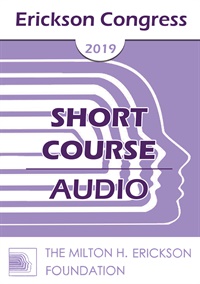
- Average Rating:
- Not yet rated
- Topic Areas:
- Short Courses | Trauma | Awareness Integration Model | Relationships
- Categories:
- Erickson Congress | Erickson Congress 2019
- Faculty:
- Foojan Zeine, Psy.D., MFT
- Duration:
- 1 Hour 28 Minutes
- Format:
- Audio Only
- Original Program Date:
- Dec 12, 2019
- Short Description:
- The effect of Traumas can persist throughout a person's lifespan and across different areas such as work, finances, intimate relationship, sexuality, relationship with body, and people at large. Beside building resiliency to reenter life's day to day activities, releasing of many beliefs that get created at the time of the trauma about the self and the world is necessary for the traumatic effect and impact to move from destructiveness to constructing life.
- Price:
- $15.00 - Base Price
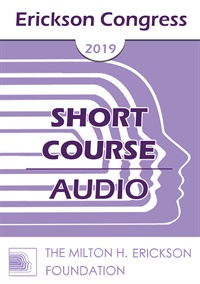
- Average Rating:
- Not yet rated
- Topic Areas:
- Short Courses | Relationships | Ericksonian Hypnosis and Therapy Techniques | Therapeutic Relationship
- Categories:
- Erickson Congress | Erickson Congress 2019
- Faculty:
- Kevin Hall, MSc
- Duration:
- 1 Hour 26 Minutes
- Format:
- Audio Only
- Original Program Date:
- Dec 12, 2019
- Short Description:
- Warmth is essential to life itself and we have therefore been attracted to it since the beginning of time. Conversely cold, the absence of warmth is associated with conditions of a more precarious nature such as scarcity, isolation or even demise. The association also seems to hold true for human relationships: people who are able to signify the concept of warmth in the way they relate to others appear socially competent, trustworthy and charismatic. The presence of warmth positively enhances attachment experiences and therefore moments of significant emotional connection.
- Price:
- $15.00 - Base Price
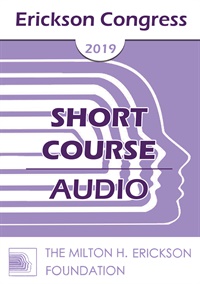
- Average Rating:
- Not yet rated
- Topic Areas:
- Short Courses | Community | Ericksonian Hypnosis and Therapy Techniques | Relationships
- Categories:
- Erickson Congress | Erickson Congress 2019
- Faculty:
- Gabrielle Peacock, MBBS
- Duration:
- 1 Hour 25 Minutes
- Format:
- Audio Only
- Original Program Date:
- Dec 12, 2019
- Short Description:
- Dr Erickson’s work with individuals, couples and families has been well explored, but what is often overlooked is his skill in information gathering and interventions that connected a client to their community. Communities are not what they were in his time and attempts to do this without first building a healing community can be fraught.
- Price:
- $15.00 - Base Price
Please wait ...


